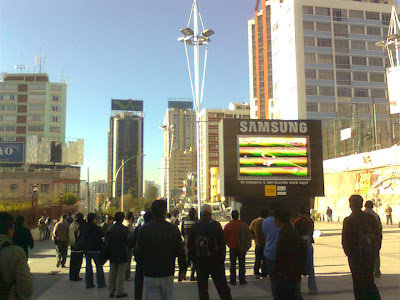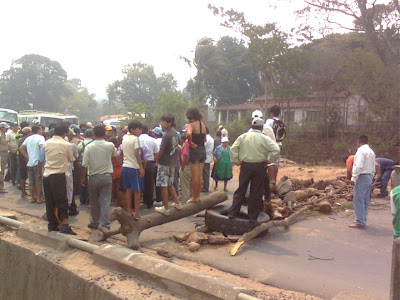Santa Cruz is even dirtier than I remember. Coming from La Paz, I've spent the past week trying to analyze how Bolivia's richest region can feel so poor. In a place where real estate costs more than in all other cities across the country, I remain utterly confused. While city streets are painted with graffiti and trash stained side walks, individual wealth can be seen everywhere, from the most per capita Hummers I've ever seen by far to high quality kitchen appliance stores plopped right in the middle of street markets. People sport American and European designer clothes. Expensive restaurants with foreign priced plates and drinks scatter the city. But beyond the night life scene of discotecs, karaoke bars, and fine dinning, Santa Cruz offers no other outlets for entertainment. All non-economic categories that measure a city's wealth point to Santa Cruz being a dilapidated zone, void of all commerce. Streets outside of the quarter square mile center remained unpaved. There are no public parks. There are no visible public works projects. A river of open sewage circles the middle vein of the city. For the city that collects the largest tax revenues of the country, evidence of public funds is invisible to eyes using anything other than a black light at a Santa Cruz nightclub.
Private sector monopolies and corrupt politicians prevent Santa Cruz from living up to its powerhouse potential. Private monopolies control electricity, cement, water, and all factory production in the country. The very powerful people running these industries limit opportunities for others to participate in the Bolivian economy by pocketing all profits and paying absurdly low wages. These industrialists, or robber barons, contribute little to society. When they leave their money in foreign banks they contribute to national banks' volatility. Importing luxury goods keeps Bolivian money from recirculating in the national economy. These wealth industrialists hoard all of Bolivia's wealth and hider the country's development.
Conversely, corrupt government officials equally impede development needs. Since weak governments lack funds to enforce restrictions on the ruling elite or their monopolies, the socialist government of Evo Morales elected to seize control of industry. Conservatives argue that governments are less efficient than markets. But Evo argues that even government ownership can provide more social benefit and economic stimulate than foreign owned and monopolized industries can. While there is merit to Evo's revolution, government corruption halts progress. A corrupt government cannot ensure institutional stability. It cannot effectively manage industrial sector development nor healthy competition while frequently stolen funds are removed from state run businesses and ministries. Building a strategic bridge might be a wonderful means to accelerate commerce, but when the project's funds disappear, little is accomplished. Redistribution becomes a myth. Instead of a rich private sector elite, corrupt socialist officials simply shifts the power to a rich political elite.
Typical solutions to the constant public/private sector fights have failed. Heavily taxing the rich and powerful, for instance, has done nothing but solidify institutional instability. The progressive third world government lacks enforcement for tax collection. When officials attempt to step up enforcement, tax collectors then cave to bribery. Even law abiding citizens not naturally inclined to avoid paying their societal dues succumb to tax evasion. Average citizens feel no obligation to give away their hard earned pennies when officials freely rob public funds. Public will fades.
Before a socialist government can effectively limit the power of private monopolists, the government must first rid itself of corruption so as to stabilize and strengthen state ministries and projects. The government can then establish restrictions on market saturation and monopoly powers by enacting laws, policies, and taxes that encourage health competition within industries -- a task that is impossible without institutional stability and adequate means of enforcement. As a tattered Santa Cruz best exemplifies, corrupt leadership is equally as inept at spreading wealth as private monopolies are. Although internally fighting corruption is even more difficult than fighting an external private sector, cleaning up industry requires it. If Bolivia wants to undergo wealth redistribution, the nation must fix its culture of corruption, which inhibits so much growth.

Corrupt Politicians Hinder Santa Cruz Development
 Center of the city where SAMSUNG placed a large screen for passerbyers to watch the World Cup.
Center of the city where SAMSUNG placed a large screen for passerbyers to watch the World Cup. Road block from last week that cut off Santa Cruz from the rest of the country.
Road block from last week that cut off Santa Cruz from the rest of the country. Friends back in Santa Cruz. From Left: Me, Vivi, Salim (Vivi's Brother), Leo (his son), Claudia (Sister-in-Law), Eduardo (The Anti-Narco Traffic Military Scuba Specialist on vacation from his post in the Amazon), Nancy (Rotary Club President of the Santa Cruz Chapter)
Friends back in Santa Cruz. From Left: Me, Vivi, Salim (Vivi's Brother), Leo (his son), Claudia (Sister-in-Law), Eduardo (The Anti-Narco Traffic Military Scuba Specialist on vacation from his post in the Amazon), Nancy (Rotary Club President of the Santa Cruz Chapter)










